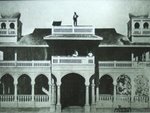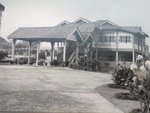Tim Kindseth published this article on Time (6th January 2009):-
+++++
Anthony Burgess's Take on Brunei
After less than two years of teaching at the Sultan Omar Ali Saifuddin College in Brunei Town, John Wilson, better known as the English novelist Anthony Burgess, nearly lost his mind. The tropical climes nagged him as much as his wife Lynne, whose zany behavior, like cursing out the Duke of Edinburgh, had turned them both into social pariahs. Add to that a bottle-of-gin-a-day drinking habit, and Burgess was pretty much pickled by September 1959, when an agreement was signed granting internal self-governance to Brunei, then a British protectorate. That month, Burgess one day crumpled like the empire around him onto the floor of his classroom. Later he would claim that he did it willfully, simply for existential kicks. But neurologists in London, where he was quickly repatriated, told him he had an inoperable brain tumor.
He didn't, thankfully, and lived to write A Clockwork Orange, the dystopian novel on which Stanley Kubrick's cult film was based. A year before it hit the book stores, he published Devil of a State, about his time in Brunei. He had begun writing the scathing send-up of British colonial life, which is an equally sarcastic take on local mores and hypocrisy, during the year doctors told him he had left to live — a period in which he wrote torrentially, hoping to leave a financial cushion for his widow-to-be. The glib novel is crazed with misanthropy, full of disloyal wives, derelict drunks, sexual assaults and riots — glimmers of what would come in the amoral, absurdist misadventures of Alex and his droogs in Clockwork.
(See the Top 10 Fiction Books of 2009.)
Devil of a State is now out of print, as hard to find as a bottle of whisky is in Bandar Seri Begawan, Brunei's capital. Barring the small amounts that non-Muslim visitors are allowed to bring in for their own use, alcohol is banned in today's Islamic Brunei. The present restrictions would have greatly dismayed Francis Burroughs Lydgate, the controller of passports, whom Burgess's book revolves around. Graying, thin, his teeth full of rot, 50-year-old Frank has married three times and hasn't been back to England in 24 years, working jobs from New Guinea to Dunia — the fictional East African uranium-rich caliphate, ruled by a cocksure potentate, where the novel takes place.
Dunia, a land of "palms and sweat and hot sauces" and stilt river villages, is clearly modeled after 1950s oil-rich, Anglophile Brunei. In Devil of a State a half-deaf U.N. adviser lives in the Residency, a version of the Bubungan Dua Belas, where British residents and high commissioners in Brunei lived until Brunei achieved full independence in 1984. Some streets in Bandar Seri Begawan retain their colonial names (Pretty, Stoney, McArthur), while the wooden House of Twelve Roofs is now a museum hung with photographs feting Brunei's "special relationship" with Britain. It helps to explain all the lingering British traces today: Queen Elizabeth II Street; a bright blue St. Andrew's Anglican Church; and red water taxis doubling as Manchester United hoardings, plying their choppy trade in the Brunei River in the shadow of the grand Sultan Omar Ali Saifuddin Mosque.
The mosque — built of creamy Italian marble and English stained glass — and its golden cupolas were, for Burgess, symbols of royal vanity. (It's something visitors to the Royal Regalia Museum, dedicated to the life of the current Sultan Hassanal Bolkiah and the many gifts he has received from international dignitaries, may well recognize.) Devil of a State ends with the consecration of a similar mosque, worked on by Paolo Tasca, a ruttish Italian marble cutter, and his gruff father Nando. Just before the ceremony, Paolo locks himself in a minaret to protest his father's imperiousness. Democracy activists take up his cause, sending him beer and curry. The latter you'll still come across, in shops run by Indians from Chennai. As for beer, you'll have to dream, like Lydgate, of the day you find your way out of town.
Read more: http://www.time.com/time/travel/article/0,31542,1951949,00.html#ixzz0bs9oN0Nl
Welcome to my private journal generally on Brunei issues. Any opinions expressed are in my personal capacity. All rights to the articles are reserved.
Thursday, January 7, 2010
Subscribe to:
Posts (Atom)











